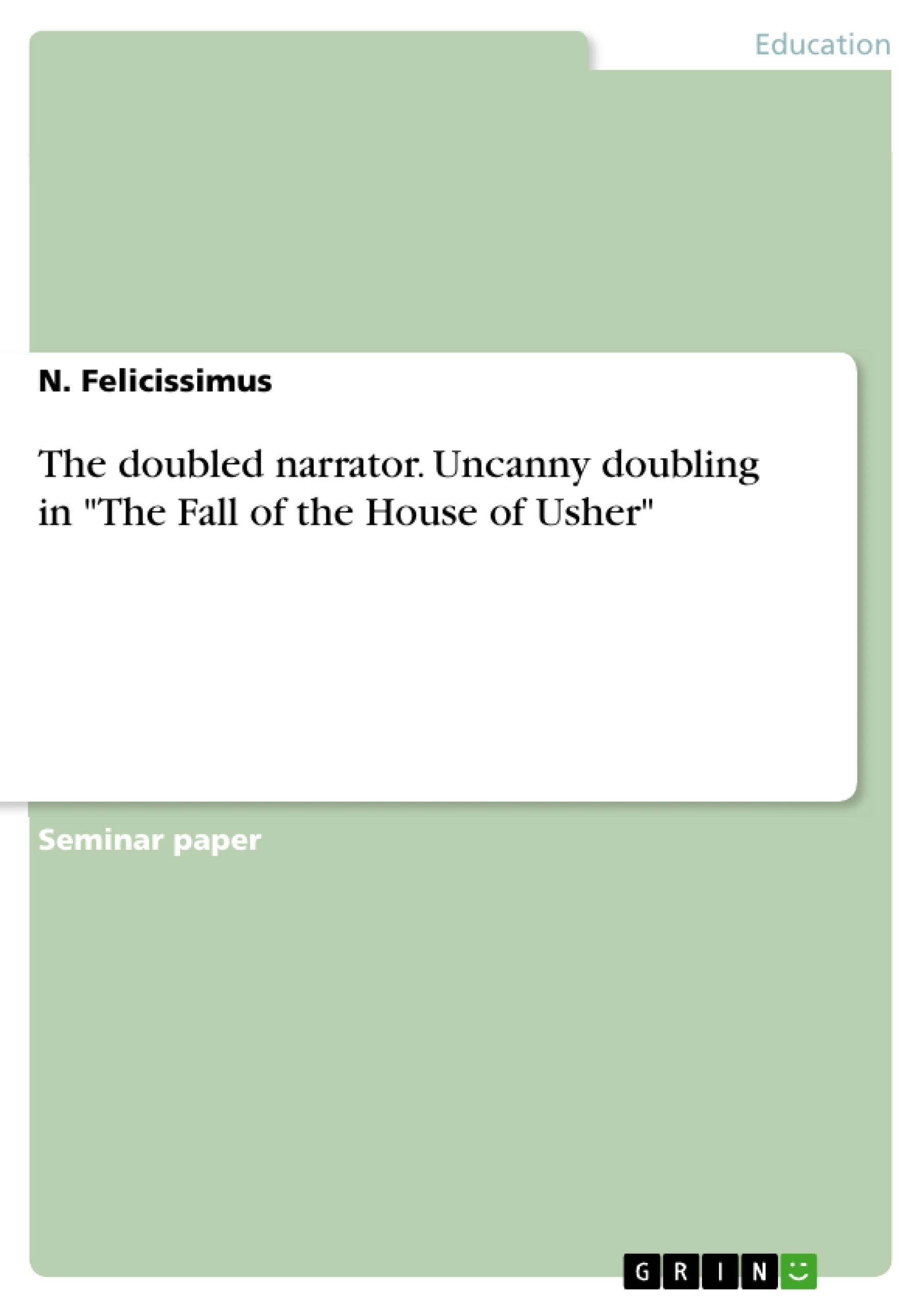"The Fall of the House of Usher" is a short story full of ambiguity, uncertainness and uncanniness. According to Poe’s “The Philosophy of Composition”, a good story needs “the totality, or unity, of effect”. This unity is created through the use of dualism.
Oppositions and literary doubling are the fundamental frame of this tale. Thus, it is explicable why there are still so manifold interpretations to various themes and motifs today. The aim of this paper is to elabo-ate the effects of doubling on the homodiegetic narrator. It will be made the attempt to support the thesis that the narrator could be seen as a doubled person himself.
Firstly, it is necessary to point out important psychological concepts and perspectives concerning doubling and so-called doppelgangers. Apart from the psychoanalysts Jentsch and Freud, who have made basic contributions to the term Doppelgängertum, also the results of Webber and Thompson will be helpful to find an appropriate frame to own interpretations and text work. After having analyzed the efects of a doubled narrative structure in the text, the narrator will be observed as a personified duality of a therapist and a patient. This thesis will be part of the next chapters, which focus on the doubling relationship between the narrator and the house respectively Roderick.
The intention of this paper is not to restrict on a single issue of doubling, but to encounter narrative structures, effects of uncanniness, a therapist-patient role and the dualism of reason and madness. By covering so many fields, it will be shown that doubling itself is the essential and unifying effect of the tale.
Inhaltsverzeichnis (Table of Contents)
- 1 Introduction
- 2.1 Doubling and its effect on the psyche
- 2.1.1 Doppelgangers and literary doubling.
- 2.1.2 Psychological dimensions.....
- 2.2 The effect of the narrative structure.
- 2.3 Narrator as therapist and patient.....
- 2.3.1 The house as a mirror.....
- 2.3.2 A doubled relationship to Roderick.
- 3 Conclusion......
Zielsetzung und Themenschwerpunkte (Objectives and Key Themes)
This paper aims to analyze the effects of doubling on the homodiegetic narrator in "The Fall of the House of Usher," arguing that the narrator can be seen as a doubled person himself. The paper examines psychological concepts of doubling and doppelgangers, analyzing the impact of a doubled narrative structure and exploring the narrator's role as both therapist and patient.
- The psychological effects of doubling and doppelgangers on the human psyche.
- The impact of a doubled narrative structure on the reader's understanding of the story.
- The narrator's complex role as both therapist and patient in his relationship with Roderick.
- The house as a reflection of the narrator's own internal conflicts.
- The intertwining of reason and madness as central themes in the story.
Zusammenfassung der Kapitel (Chapter Summaries)
- Introduction: This chapter introduces the concept of dualism and its role in creating the "totality, or unity, of effect" in Poe's short story. It highlights the ambiguity and uncanniness present in the story and sets out the paper's objective to explore the effects of doubling on the narrator.
- 2.1 Doubling and its effect on the psyche: This section delves into the psychological concepts of doubling and doppelgangers, drawing on the work of Jean Paul Richter, Ernst Jentsch, and Sigmund Freud. It examines the idea of "seeing oneself" through the lens of the Doppelgänger and explores the power dynamics between ego and alter ego as seen in the relationship between Roderick and the narrator.
- 2.2 The effect of the narrative structure: This chapter explores the impact of the doubled narrative structure on the reader's experience of the story. It examines how the ambiguous nature of the narration and the narrator's uncertain responses contribute to the feeling of uncanniness.
- 2.3 Narrator as therapist and patient: This chapter focuses on the narrator's dual role as both therapist and patient. It examines the house as a mirror of the narrator's inner struggles and explores the nature of his relationship with Roderick, highlighting the potential for influence and the narrator's gradual descent into Roderick's world.
Schlüsselwörter (Keywords)
The paper focuses on key concepts of literary doubling, doppelgangers, the uncanny, narrative structure, homodiegetic narration, therapist-patient relationships, and the dualism of reason and madness, all of which are explored in relation to the narrator's experience in "The Fall of the House of Usher." This exploration sheds light on the complex psychological effects of doubling and its implications for the reader's understanding of the story.
- Quote paper
- N. Felicissimus (Author), 2014, The doubled narrator. Uncanny doubling in "The Fall of the House of Usher", Munich, GRIN Verlag, https://www.grin.com/document/377802



